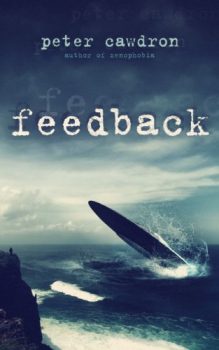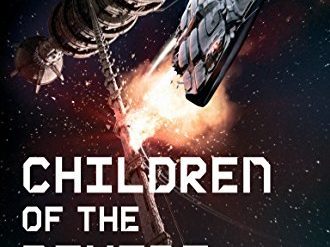
Feedback is the third of the eleven First Contact novels published to date by the gifted Australian science fiction author Peter Cawdron. Like the others I’ve read, it’s a serious effort to explore the scientific issues raised by the expectation of encountering extraterrestrial intelligence. Unfortunately, it’s the least successful. Although First Contact is at the heart of the tale, time travel dominates, and it’s monumentally confusing to follow. If the themes intrigue you and you elect to read this book, I suggest you start at the Afterword, which includes a diagram of the time loops traversed in the story. Otherwise, you may find yourself caught in a time loop yourself. I did.
At first, Feedback seems to be a First Contact tale
Feedback opens “twenty years ago” off the coast of North Korea. A helicopter of the South Korean Coast Guard is ferrying eight US Navy SEALs on a mission to rescue a child who appears to have emerged from—get this—a flying saucer after it crashed into the sea. When the helicopter comes under fire from a North Korean MIG fighter jet, the pilot, Captain John Lee, ditches it in the ocean and floats to shore, only to be captured by North Korean soldiers. In escaping from the camp where he was tortured, Lee learns that the “star child” was not a girl, as he had expected, but a small boy. Like him, the boy is ethnically Korean.
Feedback (First Contact # 3) by Peter Cawdron (2014) 462 pages ★★★☆☆
Three characters caught in a time loop
Now, twenty years later, a mathematical prodigy named Jason—a first generation Korean-American—is studying for a master’s degree in physics under the brilliant and demanding Professor Lachlan at Columbia University. Then a beautiful young Korean-American woman named Lily enters his life, and in short order all hell breaks loose. Quick cut then to John Lee back in North Korea. And you’re on your own from then on, because I don’t want to spoil any more of the story than I already have.
Exploring the issues bundled into time travel
Have no doubt: Peter Cawdron is serious about exploring the issues bundled into First Contact. For example, Jason speculates in a conversation with his friends, “One day we’ll travel to the stars, and that will be the greatest act of exploration ever undertaken, but make no mistake about it, we’re traversing an arid desert, a desolate Arctic wilderness, an oxygen-starved mountain far more dangerous and inhospitable than Everest. The distances involved and the difficulty of maintaining life in outer space should not be underestimated.” However, it seems highly improbable to me that future space explorers will become caught in a time loop.
A problem with language
Apart from the difficulty I had in following the story, I have one serious beef about this novel. Cawdron seems to assume, or at least his characters assert, that “English could last in pretty much its current form for the next ten thousand years!” Unfortunately, most science fiction writers seem to make the same assumption. But it’s hogwash. Ask any linguist.
Language is always a work in progress, evolving year by year so rapidly that much of what is spoken today may well be difficult to decipher a century from now. Consider how much change English has undergone since the fifteenth century—only five hundred years ago—when Modern English was only a glimmer on the horizon and the lingua franca of England, as it were, was still Middle English. If you’ve ever tried to read Middle English, you’ll understand. You may even understand if you’ve traveled to India lately.
For further reading
This is one of the novels in Peter Cawdron’s insightful First Contact book series.
Check out 20 engaging First Contact novels reviewed here.
For more good reading, check out:
- The ultimate guide to the all-time best science fiction novels;
- Great sci-fi novels reviewed: my top 10 (plus 100 runners-up);
- Six new science fiction authors worth reading; and
- The top 10 dystopian novels reviewed here (plus dozens of others).
And you can always find my most popular reviews, and the most recent ones, plus a guide to this whole site, on the Home Page.



























